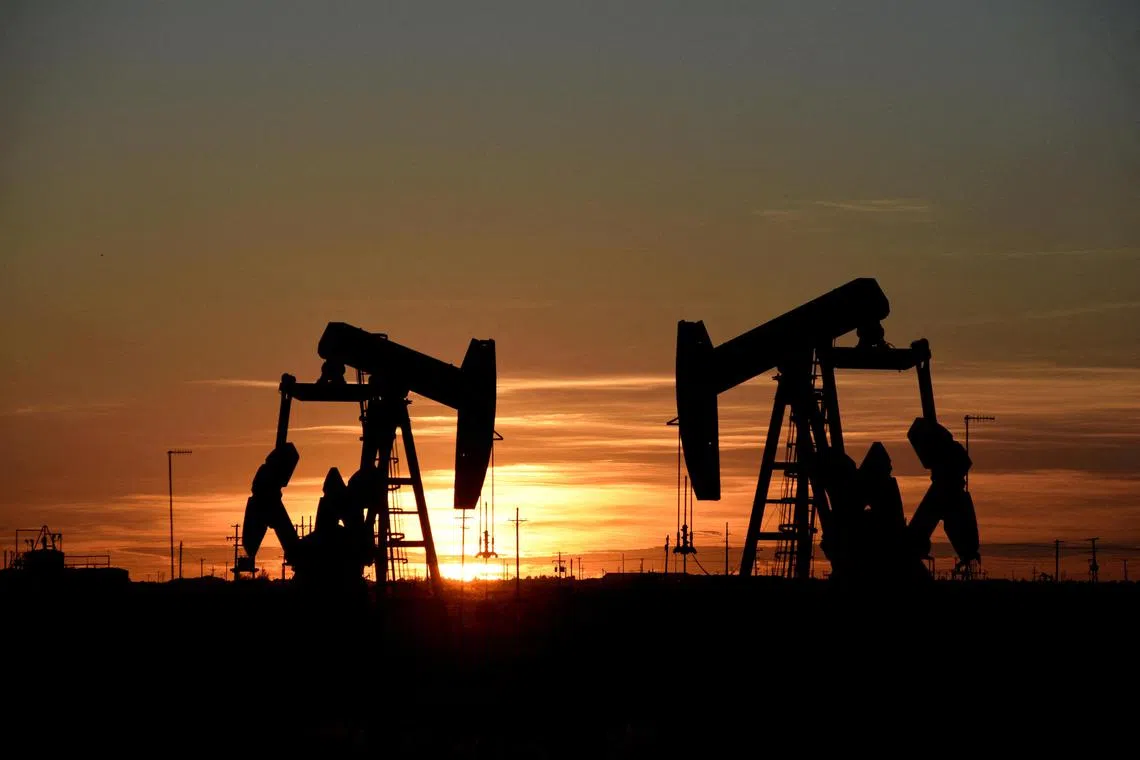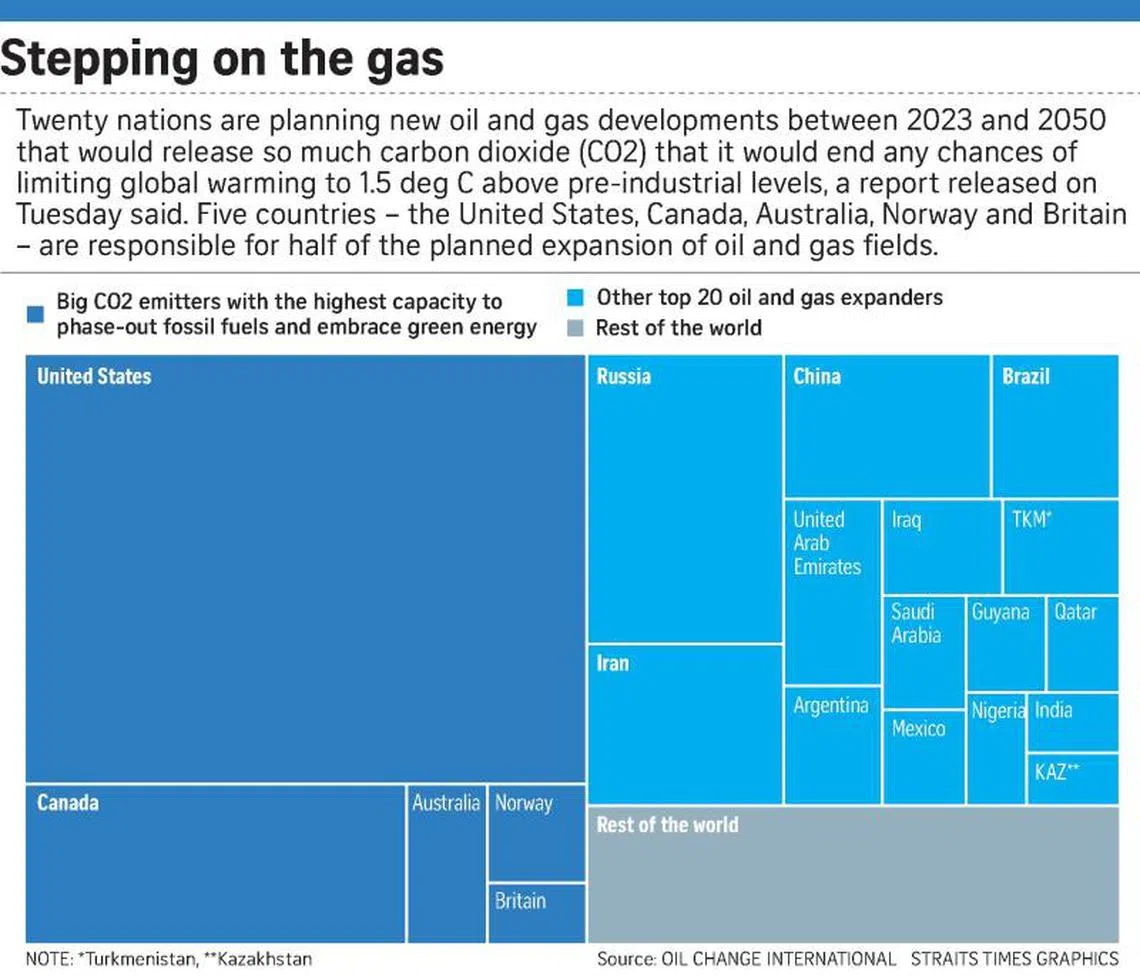New oil and gas projects in the pipeline will bust climate goals, report says
Sign up now: Get ST's newsletters delivered to your inbox

The world currently produces about 40 billion tonnes of carbon dioxide a year, mainly from burning fossil fuels and deforestation.
PHOTO: REUTERS
SINGAPORE - Nearly two dozen countries are planning new oil and gas fields and fracking wells that, if developed, would doom any chance of the world limiting warming to 1.5 deg C, a report released on Tuesday showed.
These new developments would release amounts of carbon dioxide (CO2) equivalent to that from 1,100 coal power plants over their lifetimes, said the report by Oil Change International, an advocacy group focused on the costs of the fossil fuel industry.
The authors identified 20 nations that would be responsible for nearly 90 per cent of the CO2 pollution from new oil and gas projects planned between 2023 and 2050. The United States, Canada, Australia, Norway and Britain would be responsible for half of this planned expansion, despite these nations having the greatest financial capacity to shift away from fossil fuels and embrace green energy, the report said. Other nations on the list include Russia, China, India, Saudi Arabia, the United Arab Emirates (UAE), Brazil, Nigeria and Iran.
“The science is clear that new oil and gas fields are incompatible with limiting global warming to 1.5 deg C. Yet countries are continuing to approve new oil and gas extraction that endangers the global climate objectives they signed,” said the report’s authors.
Under the 2015 Paris climate agreement, nearly 200 nations pledged to limit global warming to “well below” 2 deg C above pre-industrial levels and aim for 1.5 deg C if possible. Since then, the 1.5 deg C guard rail has become the default target, after scientists warned that exceeding it could condemn the planet to increasingly extreme weather events, faster sea-level rise and greater food insecurity.
The plans to expand the search for fossil fuels also come despite calls by the United Nations and the International Energy Agency (IEA) for no new oil and gas developments that fail to capture the CO2 they emit.
The UN’s climate science agency, the Intergovernmental Panel on Climate Change (IPCC), also said there is no more room for new oil and gas projects, and that global CO2 emissions must peak by 2025 and decline by 43 per cent from 2019 levels by 2030.
Ms Kelly Trout, research co-director at Oil Change International and the report’s co-author, said the analysis did not include ongoing investment to maintain or manage the decline of production from already operating fields.
“We looked at new fields, new fracking wells and field expansions that require new final investment decisions,” she explained to The Straits Times. The group used project data from Rystad Energy, a research and business intelligence company headquartered in Oslo, for its analysis.
“Scenarios assessed by the IEA and IPCC show that global oil and gas production needs to decline rapidly in tandem with a rapid ramp-up of renewables, and there is no room for new oil and gas supply of any kind,” Ms Trout said.
The world currently produces about 40 billion tonnes of CO2 a year, mainly from burning fossil fuels and deforestation. This is eating away at a rapidly declining “carbon budget” that could be exhausted in less than a decade and lead to the world warming an average of 1.5 deg C.
Ms Trout said the oil and gas production already committed from existing sites is enough to exceed the 1.5 deg C limit. Anything more would bust the carbon budget by a wide margin.
The oil and gas contained in these new projects would cause 173 billion tonnes of cumulative CO2 pollution between 2023 and 2050 if fully extracted and burned, equivalent to more than 30 years of annual US carbon emissions, the report said.
Britain has come under heavy criticism for committing in July to granting hundreds of licences for North Sea oil and gas extraction. The Biden administration has also copped flak for approving a major oil project in Alaska earlier in the year, though the government also cancelled Trump-era oil and gas leases in the Arctic National Wildlife Refuge in September.
The UAE, host of the COP28 climate talks, is spending US$150 billion (S$204 billion) until 2027 to boost oil and gas output, but has also pledged to spend US$54 billion on renewables by 2030.
“Too many fossil fuel projects are already developed, and the consequences are devastating communities. Governments must commit to stop making the problem worse,” the report said.




